Take a deep dive into the latest topics in our field over lunch at the 59th Annual Drosophila Research Conference. Each discussion at the Community, Connections, & Lunch event will be moderated by established and up-and-coming community leaders, who will explore the latest scientific findings, such as presentations from the conference and hot topics in the literature, or other professional development and community issues. Don’t miss out on these important conversations, we want a diversity of voices to join!
If you’ve already registered for the conference, sign up for Community, Connections, & Lunch here.
If you have not yet registered for the conference, you can also sign up for the lunch via the conference registration form.
Check out the topics and discussion leader bios below:
Scientific Topics:
Cell Biology & Signal Transduction
Susan Klinedinst and Mark Peifer
Cell Death
Kristin White and Tin Tin Su
Cell Division & Growth Control
Wu-Min Deng and Cassandra Extavour
Chromatin & Epigenetics
Barbara Mellone and Ting Wu
Evolution and Population Genetics
Maria Vibranovski and Dmitri Petrov
Gametogenesis
Scott Hawley and Ming Gao
Immunity
Catherine Brennan and Ylva Engstrom
Intracellular Dynamics
Blake Riggs and Amy Kiger
Mitochondrial Biology
Marcos Oliveira and David Rand
Models of Human Disease—Development & Physiological Disorders
Clement Chow and Daniela Zarnescu
Models of Human Disease—Neurological Disorders
Joshua Mast and Kristi Wharton
Neural Development & Physiology
Jennifer Jemc and Vanessa Auld
Physiology, Metabolism, & Aging
Thomas Merritt and Nicole Riddle
Professional Development and Community Topics:
Applying to Grad School & Postdoc Positions
Sudhir Kumar and Aleeza Gerstein
Careers in Science
Natalie Chernets, Alex Erwin, and Dave Zucker
Education Publishing
Michelle Smith and Sally Elgin
Science Communication & Outreach
Stephanie Mohr and Andreas Prokop
Staff Scientist Careers
Claire Hu and Alexei Arnaoutov
Discussion Leaders:
Cell biology & Signal Transduction
Mark Peifer
 Ever since beginning graduate work in the Bender lab at Harvard Medical School, Mark has been interested in how a fertilized egg self-assembles itself into an animal. As a postdoc with Eric Wieschaus at Princeton, he began work on ß-catenin, exploring its dual roles in cell adhesion and Wnt signaling. His lab at UNC began in 1992, and his team has continued and expanded this work, exploring cell adhesion, cytoskeletal regulation, and Wnt signaling in development and disease, using Drosophila and cultured mammalian cells. Outside the lab, he lives in the woods near Saxapahaw with his spouse and two daughters and is obsessed with native wildflowers and reducing global inequities in education and health care. Ask him about his trips to Haiti, or about the mystery flag which flies outside of his office.
Ever since beginning graduate work in the Bender lab at Harvard Medical School, Mark has been interested in how a fertilized egg self-assembles itself into an animal. As a postdoc with Eric Wieschaus at Princeton, he began work on ß-catenin, exploring its dual roles in cell adhesion and Wnt signaling. His lab at UNC began in 1992, and his team has continued and expanded this work, exploring cell adhesion, cytoskeletal regulation, and Wnt signaling in development and disease, using Drosophila and cultured mammalian cells. Outside the lab, he lives in the woods near Saxapahaw with his spouse and two daughters and is obsessed with native wildflowers and reducing global inequities in education and health care. Ask him about his trips to Haiti, or about the mystery flag which flies outside of his office.
Cell Division & Growth Control
Wu-Min Deng
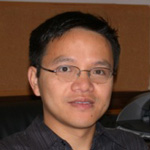 Wu-Min Deng is a Professor at Florida State University. His lab is interested in how intercellular communications affect normal development and how disruption of such communications leads to abnormalities such as tumorigenesis in the Drosophila model system. Their current research has three major foci: (1) Characterization of “tumor hotspots” in Drosophila epithelial tissues; (2) Notch signaling in cell growth and tumorigenesis; and (3) the molecular mechanisms underlying postmitotic cell competition and compensatory cellular hypertrophy.
Wu-Min Deng is a Professor at Florida State University. His lab is interested in how intercellular communications affect normal development and how disruption of such communications leads to abnormalities such as tumorigenesis in the Drosophila model system. Their current research has three major foci: (1) Characterization of “tumor hotspots” in Drosophila epithelial tissues; (2) Notch signaling in cell growth and tumorigenesis; and (3) the molecular mechanisms underlying postmitotic cell competition and compensatory cellular hypertrophy.
Cassandra Extavour
 Cassandra Extavour is a Professor of Organismic and Evolutionary Biology and of Molecular and Cellular Biology at Harvard University. The Extavour laboratory is interested in understanding early embryonic development, the genes that control this development, the evolutionary origins of these genes, and how their functions have changed over evolutionary time. The lab is particularly interested in the development and evolution of reproductive systems, including both germ cells, which are cells that make eggs and sperm in sexually reproducing animals, and somatic gonad cells, which create the structures to house and protect the germ cells, and regulate egg and sperm production.
Cassandra Extavour is a Professor of Organismic and Evolutionary Biology and of Molecular and Cellular Biology at Harvard University. The Extavour laboratory is interested in understanding early embryonic development, the genes that control this development, the evolutionary origins of these genes, and how their functions have changed over evolutionary time. The lab is particularly interested in the development and evolution of reproductive systems, including both germ cells, which are cells that make eggs and sperm in sexually reproducing animals, and somatic gonad cells, which create the structures to house and protect the germ cells, and regulate egg and sperm production.
Chromatin & Epigenetics
Barbara Mellone
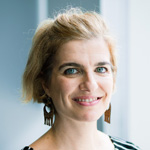 Barbara Mellone is an Associate Professor of Molecular and Cell Biology at the University of Connecticut. Originally from Italy, she obtained her PhD in molecular genetics from the Medical Research Council in Edinburgh, Scotland, where she studied heterochromatin silencing mechanisms in S. pombe under the mentorship of Robin Allshire. For her postdoctoral training, Mellone moved to the US to join Gary Karpen’s group at LBNL and UC Berkeley to work on centromere assembly in Drosophila. She joined the faculty of the University of Connecticut in 2009, where she investigates centromere specification mechanisms. In 2016, she was the recipient of the American Society for Cell Biology Women in Cell Biology Junior Award for excellence in research.
Barbara Mellone is an Associate Professor of Molecular and Cell Biology at the University of Connecticut. Originally from Italy, she obtained her PhD in molecular genetics from the Medical Research Council in Edinburgh, Scotland, where she studied heterochromatin silencing mechanisms in S. pombe under the mentorship of Robin Allshire. For her postdoctoral training, Mellone moved to the US to join Gary Karpen’s group at LBNL and UC Berkeley to work on centromere assembly in Drosophila. She joined the faculty of the University of Connecticut in 2009, where she investigates centromere specification mechanisms. In 2016, she was the recipient of the American Society for Cell Biology Women in Cell Biology Junior Award for excellence in research.
Ting Wu
 Ting (C.-ting) Wu is a Professor of Genetics at Harvard Medical School. She is also Director of the Consortium for Space Genetics and Director of the Personal Genetics Education (pgEd.org) Project. Her group focuses on chromosome behavior and genome organization, and to that end, they also develop methods for imaging the genome in situ. Two such methods, OligoSTORM and OligoDNA-PAINT, enable ≤20 nm resolution. Her group also studies sequence ultraconservation in mammals and its potential role in maintaining genome integrity. Through pgEd, she works to enable equal access to awareness and dialogue about personal genetics and genetic technologies.
Ting (C.-ting) Wu is a Professor of Genetics at Harvard Medical School. She is also Director of the Consortium for Space Genetics and Director of the Personal Genetics Education (pgEd.org) Project. Her group focuses on chromosome behavior and genome organization, and to that end, they also develop methods for imaging the genome in situ. Two such methods, OligoSTORM and OligoDNA-PAINT, enable ≤20 nm resolution. Her group also studies sequence ultraconservation in mammals and its potential role in maintaining genome integrity. Through pgEd, she works to enable equal access to awareness and dialogue about personal genetics and genetic technologies.
Evolution and Population Genetics
Maria Vibranovski
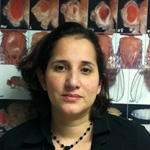 Maria Vibranovski received her PhD from the University of São Paulo in 2005 in Brazil. She won the prestigious award of a Pew Latin American Fellowship to pursue her scientific training in a postdoctoral research with Manyuan Long in the Department of Ecology and Evolution at the University of Chicago. She developed the first techniques for male germline cell dissection and generated the first large-scale gene expression database for the different phases of Drosophila melanogaster spermatogenesis. She and collaborators showed that Meiotic Sex Chromosome Inactivation drives the chromosomal evolution and distribution of male-biased expressed genes in Drosophila as well as showing that there is de novo RNA synthesis in male Drosophila post-meiosis, which was once thought to be transcriptionally inactive. Since 2012, Vibranovski is an Assistant Professor at the University of São Paulo investigating the impact of gametogenesis on the evolution of new genes.
Maria Vibranovski received her PhD from the University of São Paulo in 2005 in Brazil. She won the prestigious award of a Pew Latin American Fellowship to pursue her scientific training in a postdoctoral research with Manyuan Long in the Department of Ecology and Evolution at the University of Chicago. She developed the first techniques for male germline cell dissection and generated the first large-scale gene expression database for the different phases of Drosophila melanogaster spermatogenesis. She and collaborators showed that Meiotic Sex Chromosome Inactivation drives the chromosomal evolution and distribution of male-biased expressed genes in Drosophila as well as showing that there is de novo RNA synthesis in male Drosophila post-meiosis, which was once thought to be transcriptionally inactive. Since 2012, Vibranovski is an Assistant Professor at the University of São Paulo investigating the impact of gametogenesis on the evolution of new genes.
Dmitri Petrov
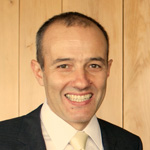 Dmitri Petrov is a Michelle and Kevin Douglas Professor of Biology and Associate Chair of the Biology Department of Stanford University. He received his PhD in 1997 from Harvard University under the guidance of Daniel Hartl and Richard Lewontin. He was a Junior Fellow at the Harvard Society of Fellows and a Research Fellow in the Genetics Department at Harvard Medical School under the guidance of Chao-Ting Wu. Dmitri came to Stanford in 2000 as an Assistant Professor. The Petrov Lab does theoretical, computational and experimental work to address questions in molecular evolution and molecular population genomics. The primary focus at the moment is on (i) population genetics and molecular mechanisms of adaptation and (ii) genome evolution.
Dmitri Petrov is a Michelle and Kevin Douglas Professor of Biology and Associate Chair of the Biology Department of Stanford University. He received his PhD in 1997 from Harvard University under the guidance of Daniel Hartl and Richard Lewontin. He was a Junior Fellow at the Harvard Society of Fellows and a Research Fellow in the Genetics Department at Harvard Medical School under the guidance of Chao-Ting Wu. Dmitri came to Stanford in 2000 as an Assistant Professor. The Petrov Lab does theoretical, computational and experimental work to address questions in molecular evolution and molecular population genomics. The primary focus at the moment is on (i) population genetics and molecular mechanisms of adaptation and (ii) genome evolution.
Gametogenesis
Ming Gao
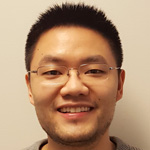 Ming Gao is a third-year tenure-track assistant professor in the Biology Department at Indiana University Northwest. In this primarily undergraduate institute, he engages mostly undergraduate students in germ cell genetics research. He is interested in how germ cells are specified during Drosophila oogenesis. He aims to find out how maternal proteins like maternal expression at 31B (Me31B) contribute to the assembly of germ plasm, a cytoplasmic determinant that leads to germ cell formation.
Ming Gao is a third-year tenure-track assistant professor in the Biology Department at Indiana University Northwest. In this primarily undergraduate institute, he engages mostly undergraduate students in germ cell genetics research. He is interested in how germ cells are specified during Drosophila oogenesis. He aims to find out how maternal proteins like maternal expression at 31B (Me31B) contribute to the assembly of germ plasm, a cytoplasmic determinant that leads to germ cell formation.
Immunity
Catherine Brennan
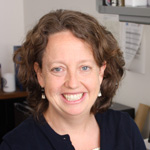 Katie Brennan is in her 5th year as an Assistant Professor at California State University, Fullerton, where her laboratory investigates the contributions of fly hemocytes to the immune response, as well as mechanisms that regulate phagocytic degradation of ingested microbes. Katie started this position after a 7-year hiatus from Drosophila research, which included 4 years of work on human HIV immunology. She earned her PhD with Kevin Moses studying fly eye development, followed by postdocs with Kathryn Anderson and David Schneider studying fly immunity.
Katie Brennan is in her 5th year as an Assistant Professor at California State University, Fullerton, where her laboratory investigates the contributions of fly hemocytes to the immune response, as well as mechanisms that regulate phagocytic degradation of ingested microbes. Katie started this position after a 7-year hiatus from Drosophila research, which included 4 years of work on human HIV immunology. She earned her PhD with Kevin Moses studying fly eye development, followed by postdocs with Kathryn Anderson and David Schneider studying fly immunity.
Ylva Engström
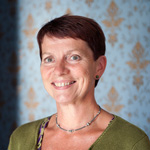 Ylva Engström is a Professor of Molecular Biology and also Vice Dean of the Science Faculty at Stockholm University. She is known for discovering that Drosophila immune genes are regulated by NF-kB/Rel and GATA transcription factors, and more recently that POU transcription factors control immune gene expression in barrier epithelia. She currently studies a novel regulatory mechanism of host-microbe interactions and gut immune homeostasis, mediated by antagonistic transcription factor isoforms. This has also led into studies of gut microbial communities, as well as gut epithelium regeneration and intestinal stem cell regulation.
Ylva Engström is a Professor of Molecular Biology and also Vice Dean of the Science Faculty at Stockholm University. She is known for discovering that Drosophila immune genes are regulated by NF-kB/Rel and GATA transcription factors, and more recently that POU transcription factors control immune gene expression in barrier epithelia. She currently studies a novel regulatory mechanism of host-microbe interactions and gut immune homeostasis, mediated by antagonistic transcription factor isoforms. This has also led into studies of gut microbial communities, as well as gut epithelium regeneration and intestinal stem cell regulation.
Intracellular Dynamics
Amy Kiger
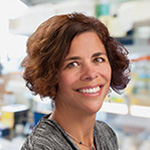 Amy Kiger is an Associate Professor at the University of California, San Diego. Her laboratory examines central roles for novel membrane trafficking processes, under control of spatiotemporal lipid regulation, that coordinate dynamic cell structure. Using a foundation in genetic and cell biology experiments to link specific lipid kinase and phosphatase activities to cell remodeling, they aim to identify conserved mechanisms of membrane regulation in immune and muscle cell function, to provide insights into related human diseases.
Amy Kiger is an Associate Professor at the University of California, San Diego. Her laboratory examines central roles for novel membrane trafficking processes, under control of spatiotemporal lipid regulation, that coordinate dynamic cell structure. Using a foundation in genetic and cell biology experiments to link specific lipid kinase and phosphatase activities to cell remodeling, they aim to identify conserved mechanisms of membrane regulation in immune and muscle cell function, to provide insights into related human diseases.
Blake Riggs
 Blake Riggs uses his own story of prejudiced encounters, personal stumbles, and the eventual discovery of his own tenaciousness to help increase diversity in the sciences. He earned a PhD in molecular, cell and development biology, completed his postdoctoral work at UC Berkeley, and now works as an Assistant Professor of Cell and Molecular Biology at San Francisco State, where he runs a lab that is working to better understand the process of cell division and selection of cell fate. Last year, Riggs was awarded a prestigious National Science Foundation CAREER grant for excellence in teaching and research.
Blake Riggs uses his own story of prejudiced encounters, personal stumbles, and the eventual discovery of his own tenaciousness to help increase diversity in the sciences. He earned a PhD in molecular, cell and development biology, completed his postdoctoral work at UC Berkeley, and now works as an Assistant Professor of Cell and Molecular Biology at San Francisco State, where he runs a lab that is working to better understand the process of cell division and selection of cell fate. Last year, Riggs was awarded a prestigious National Science Foundation CAREER grant for excellence in teaching and research.
Mitochondrial Biology
Marcos Oliveira
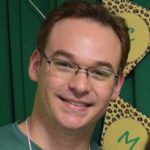 Marcos Oliveira has BS and MSc degrees from the State University of Campinas (Brazil), a PhD degree from Michigan State University (USA), and postdoctoral experience from the University of Tampere (Finland). He uses the power of Drosophila genetics and molecular biology tools, which he learned in Laurie Kaguni’s and Howy Jacobs’s labs, to research two areas of interest in mitochondrial biology in his new lab in the Sao Paulo State University, Jaboticabal campus: the structure, function and evolution of mitochondrial DNA replication; and biology and the biochemistry of animal mitochondrial alternative oxidase.
Marcos Oliveira has BS and MSc degrees from the State University of Campinas (Brazil), a PhD degree from Michigan State University (USA), and postdoctoral experience from the University of Tampere (Finland). He uses the power of Drosophila genetics and molecular biology tools, which he learned in Laurie Kaguni’s and Howy Jacobs’s labs, to research two areas of interest in mitochondrial biology in his new lab in the Sao Paulo State University, Jaboticabal campus: the structure, function and evolution of mitochondrial DNA replication; and biology and the biochemistry of animal mitochondrial alternative oxidase.
David Rand
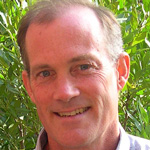 David Rand is the Stephen T. Olney Professor of Natural History in the Department of Ecology and Evolutionary Biology, where he is Chair of the Department. He joined the Brown faculty in 1991 after receiving a B.A. at Harvard, a PhD at Yale, and postdoctoral training in population genetics at Harvard. He teaches undergraduate courses in evolutionary biology, evolutionary genetics, and graduate seminars on ecological and evolutionary genomics. His research focuses on the coevolution of nuclear and mitochondrial genomes, the role of mitochondrial mutations in fitness, aging and disease, and the environmental genomics of adaptation in marine organisms, with funding from the NIH and NSF. He is Principle Investigator of an NIH COBRE award on the Computational Biology of Human Disease.
David Rand is the Stephen T. Olney Professor of Natural History in the Department of Ecology and Evolutionary Biology, where he is Chair of the Department. He joined the Brown faculty in 1991 after receiving a B.A. at Harvard, a PhD at Yale, and postdoctoral training in population genetics at Harvard. He teaches undergraduate courses in evolutionary biology, evolutionary genetics, and graduate seminars on ecological and evolutionary genomics. His research focuses on the coevolution of nuclear and mitochondrial genomes, the role of mitochondrial mutations in fitness, aging and disease, and the environmental genomics of adaptation in marine organisms, with funding from the NIH and NSF. He is Principle Investigator of an NIH COBRE award on the Computational Biology of Human Disease.
Models of Human Disease: Development & Physiological Disorders
Clement Chow
 Clement Chow received his BA from Cornell University in 2003. He completed his PhD in 2008 in the Department of Human Genetics at the University of Michigan, where he worked with Miriam Meisler. Clement completed his postdoctoral training as a co-mentored postdoc with Andy Clark and Mariana Wolfner at Cornell University. While not in the lab, he is wrangling two unruly children.
Clement Chow received his BA from Cornell University in 2003. He completed his PhD in 2008 in the Department of Human Genetics at the University of Michigan, where he worked with Miriam Meisler. Clement completed his postdoctoral training as a co-mentored postdoc with Andy Clark and Mariana Wolfner at Cornell University. While not in the lab, he is wrangling two unruly children.
Daniela Zarnescu
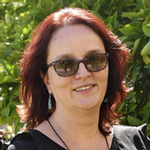 Daniela Zarnescu is a Professor of Molecular and Cellular Biology at the University of Arizona. She uses Drosophila to study RNA-based mechanisms in aging and neurodegenerative diseases. Recently, her laboratory identified mechanisms by which RNA granule components contribute to synaptic dysfunction and neuronal degeneration in flies and humans.
Daniela Zarnescu is a Professor of Molecular and Cellular Biology at the University of Arizona. She uses Drosophila to study RNA-based mechanisms in aging and neurodegenerative diseases. Recently, her laboratory identified mechanisms by which RNA granule components contribute to synaptic dysfunction and neuronal degeneration in flies and humans.
Models of Human Disease: Neurological Disorders
Joshua Mast
 Josh Mast leads the Drosophila drug screening pipeline at Perlara PBC, a drug discovery platform company based in South San Francisco. Perlara partners with patient advocacy groups to model rare diseases and develop small molecule therapeutics using flies, worms, and yeast. Josh received his PhD in Neuroscience from Stanford University in the laboratory of Tom Clandinin, exploring the molecular and cellular mechanisms driving aspects of synapse development and degeneration. He continued his studies as a postdoctoral fellow with David Stern at Princeton University and Janelia Research Campus, HHMI researching the impact of genetic variation on neural circuit function.
Josh Mast leads the Drosophila drug screening pipeline at Perlara PBC, a drug discovery platform company based in South San Francisco. Perlara partners with patient advocacy groups to model rare diseases and develop small molecule therapeutics using flies, worms, and yeast. Josh received his PhD in Neuroscience from Stanford University in the laboratory of Tom Clandinin, exploring the molecular and cellular mechanisms driving aspects of synapse development and degeneration. He continued his studies as a postdoctoral fellow with David Stern at Princeton University and Janelia Research Campus, HHMI researching the impact of genetic variation on neural circuit function.
Kristi Wharton
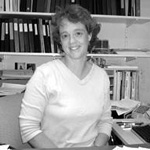 Kristi Wharton is a Professor of Biology at Brown University and affiliated with the Brown Institute for Brain Science (BIBS). Throughout her career, her research has focused on understanding the mechanistic underpinnings of intercellular signaling regulation during development, and the consequences of signaling dysfunction that results in developmental abnormalities and disease.
Kristi Wharton is a Professor of Biology at Brown University and affiliated with the Brown Institute for Brain Science (BIBS). Throughout her career, her research has focused on understanding the mechanistic underpinnings of intercellular signaling regulation during development, and the consequences of signaling dysfunction that results in developmental abnormalities and disease.
Neural Development & Physiology
Vanessa Auld
 Vanessa Auld is a Professor in the Department of Zoology at the University of British Columbia and was the Associate Dean of Equity and Diversity. Her research program investigates the roles that glia play in the development and function of the nervous system. Glia are essential to nervous system development and function, and a key role is the formation of the glial wrap that protects and insulates their associated axons and nerves and generates the blood-brain barrier. In particular in Drosophila, loss of glial sheath results in the disruption of the blood-brain barrier, resulting in paralysis and death. Critical to the formation of the glia sheath is adhesion between glia themselves and between glia and the extracellular matrix. Yet how glial cell adhesion and communication is regulated during the formation of the glial sheath is not well established. Junctions such as septate junctions, gap junctions, and adherens junctions are all key players in the establishment of the glia sheath, and mediate not only development but are also key to the stability of the sheath as the nervous system expands during larval development. How these functions mediate glial sheath development and stability is the main focus of the research in the Auld Lab.
Vanessa Auld is a Professor in the Department of Zoology at the University of British Columbia and was the Associate Dean of Equity and Diversity. Her research program investigates the roles that glia play in the development and function of the nervous system. Glia are essential to nervous system development and function, and a key role is the formation of the glial wrap that protects and insulates their associated axons and nerves and generates the blood-brain barrier. In particular in Drosophila, loss of glial sheath results in the disruption of the blood-brain barrier, resulting in paralysis and death. Critical to the formation of the glia sheath is adhesion between glia themselves and between glia and the extracellular matrix. Yet how glial cell adhesion and communication is regulated during the formation of the glial sheath is not well established. Junctions such as septate junctions, gap junctions, and adherens junctions are all key players in the establishment of the glia sheath, and mediate not only development but are also key to the stability of the sheath as the nervous system expands during larval development. How these functions mediate glial sheath development and stability is the main focus of the research in the Auld Lab.
Jennifer Jemc
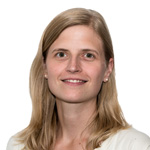 Jennifer Jemc is an Assistant Professor of Biology at Loyola University Chicago. Her lab is interested in the molecular mechanisms that regulate the establishment of cell-cell interactions during development and the maintenance of organ homeostasis in the adult. Specifically, the lab focuses on the interaction of somatic gonadal cells and germ cells in the gonad, and neurons and glia in the nervous system. Recent work in the lab has demonstrated that altered JNK signaling can lead to developmental defects in both of these contexts.
Jennifer Jemc is an Assistant Professor of Biology at Loyola University Chicago. Her lab is interested in the molecular mechanisms that regulate the establishment of cell-cell interactions during development and the maintenance of organ homeostasis in the adult. Specifically, the lab focuses on the interaction of somatic gonadal cells and germ cells in the gonad, and neurons and glia in the nervous system. Recent work in the lab has demonstrated that altered JNK signaling can lead to developmental defects in both of these contexts.
Physiology, Metabolism, & Aging
Thomas Merritt
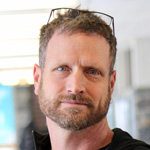 Thomas Merritt combines the power of bioinformatics, functional genomics, and experimentation to explore metabolism and genetic networks. Merritt’s group studies the interactions between genes, genetic backgrounds, and the environment in a variety of stress response systems. In one project, they are using metabolomics and the SNOLAB particle physics laboratory, located 2 km underground in an active mine, to understand deep underground physiology. Other projects investigate oxidative stress and the NADP(H) enzymes. Merritt’s contributions also extend beyond the research setting and into the non-scientific community. As a committed science communicator and partner with Science North, Canada’s second largest science centre, Merritt has shared the importance of genetics research as a TEDx speaker, educator, and as a contributor to news sources. His article on trapping flies – and the science of model species – was the most read article of 2017 at TheConversation.ca, an online academic news source. In 2017, Merritt partnered with a local primary school to set a world record for most people isolating DNA at one time.
Thomas Merritt combines the power of bioinformatics, functional genomics, and experimentation to explore metabolism and genetic networks. Merritt’s group studies the interactions between genes, genetic backgrounds, and the environment in a variety of stress response systems. In one project, they are using metabolomics and the SNOLAB particle physics laboratory, located 2 km underground in an active mine, to understand deep underground physiology. Other projects investigate oxidative stress and the NADP(H) enzymes. Merritt’s contributions also extend beyond the research setting and into the non-scientific community. As a committed science communicator and partner with Science North, Canada’s second largest science centre, Merritt has shared the importance of genetics research as a TEDx speaker, educator, and as a contributor to news sources. His article on trapping flies – and the science of model species – was the most read article of 2017 at TheConversation.ca, an online academic news source. In 2017, Merritt partnered with a local primary school to set a world record for most people isolating DNA at one time.
Nicole Riddle
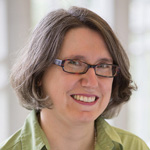 Nicole C. Riddle is an Assistant Professor in the Department of Biology at the University of Alabama at Birmingham. In her scientific career, she has studied various aspects of epigenetics in plants and animals. Her lab utilizes Drosophila melanogaster to study various open questions in the area of epigenetics and chromatin, focusing mainly on the HP1 protein family and heterochromatin. She also has a second research focus in exercise genetics, again, using the fruit fly model.
Nicole C. Riddle is an Assistant Professor in the Department of Biology at the University of Alabama at Birmingham. In her scientific career, she has studied various aspects of epigenetics in plants and animals. Her lab utilizes Drosophila melanogaster to study various open questions in the area of epigenetics and chromatin, focusing mainly on the HP1 protein family and heterochromatin. She also has a second research focus in exercise genetics, again, using the fruit fly model.
Applying to Grad School & Postdoc Positions
Sudhir Kumar
 Sudhir Kumar is the Director of the Institute for Genomics and Evolutionary Medicine (iGEM) and a Carnell Professor in the Department of Biology at Temple University. He has been an early leader in exploring the theoretical and empirical intersection of evolutionary biology with computational biology, and forging accessible tools that allow researchers from diverse backgrounds to harness the analytical power of modern computational biology (e.g., www.megasoftware.net; www.flyexpress.net; and www.timetree.org). He has made numerous contributions to the mathematical theory of phylogenetics through advances in estimating evolutionary distances, inference of divergence times, and algorithms for constructing phylogenetic trees. Kumar and his laboratory continue to work actively on improving phylogenetic theory and applications to the growing field of phylomedicine, which explores disease via phylogenetic methods and makes predictions informed by evolutionary biology. Kumar has published numerous citation classics and hot papers. He is a fellow of the American Association for the Advancement of Science and is currently serving as the Editor in Chief of the journal Molecular Biology and Evolution.
Sudhir Kumar is the Director of the Institute for Genomics and Evolutionary Medicine (iGEM) and a Carnell Professor in the Department of Biology at Temple University. He has been an early leader in exploring the theoretical and empirical intersection of evolutionary biology with computational biology, and forging accessible tools that allow researchers from diverse backgrounds to harness the analytical power of modern computational biology (e.g., www.megasoftware.net; www.flyexpress.net; and www.timetree.org). He has made numerous contributions to the mathematical theory of phylogenetics through advances in estimating evolutionary distances, inference of divergence times, and algorithms for constructing phylogenetic trees. Kumar and his laboratory continue to work actively on improving phylogenetic theory and applications to the growing field of phylomedicine, which explores disease via phylogenetic methods and makes predictions informed by evolutionary biology. Kumar has published numerous citation classics and hot papers. He is a fellow of the American Association for the Advancement of Science and is currently serving as the Editor in Chief of the journal Molecular Biology and Evolution.
Aleeza Gerstein
![]() Aleeza Gerstein had a bicontinental postdoc in Tel Aviv, Israel and Minneapolis, Minnesota from 2013–2018. As a Canadian, this meant she twice navigated setting up her life for living internationally. She held postdoctoral fellowships through the Canadian government (NSERC, basic sciences & CIHR, health research) and an Israeli Foundation (Azrieli Foundation) to further her research program on the genetic basis of antifungal resistance in human fungal pathogens.
Aleeza Gerstein had a bicontinental postdoc in Tel Aviv, Israel and Minneapolis, Minnesota from 2013–2018. As a Canadian, this meant she twice navigated setting up her life for living internationally. She held postdoctoral fellowships through the Canadian government (NSERC, basic sciences & CIHR, health research) and an Israeli Foundation (Azrieli Foundation) to further her research program on the genetic basis of antifungal resistance in human fungal pathogens.
Careers in Science
Natalie Chernets
 Natalie Chernets is the first Administrative Postdoctoral Fellow at Thomas Jefferson University and a professional development enthusiast. With multidisciplinary training in physics, electrical engineering, and biomedical sciences, she easily speaks the languages of medical doctors, biologists, physicists, and engineers. Natalie excels in drawing ideas from multiple disciplines and enjoys creating opportunities by connecting different people. In her role as a Mentoring Co-Chair for the Philadelphia chapter of the Association for Women in Science she leads the recruitment of local mentors and promotes the program to trainees. As an upcoming Director of the Office of Postdoctoral Affairs at Drexel University, she will lead professional development and mentoring of postdoctoral fellows.
Natalie Chernets is the first Administrative Postdoctoral Fellow at Thomas Jefferson University and a professional development enthusiast. With multidisciplinary training in physics, electrical engineering, and biomedical sciences, she easily speaks the languages of medical doctors, biologists, physicists, and engineers. Natalie excels in drawing ideas from multiple disciplines and enjoys creating opportunities by connecting different people. In her role as a Mentoring Co-Chair for the Philadelphia chapter of the Association for Women in Science she leads the recruitment of local mentors and promotes the program to trainees. As an upcoming Director of the Office of Postdoctoral Affairs at Drexel University, she will lead professional development and mentoring of postdoctoral fellows.
Alexandra Erwin
![]() Alex Erwin is a trained geneticist working for the nonprofit BioKansas to develop workforce-related programming and professional development for scientists in her area. She spearheaded two major collaborative efforts at the University of Kansas: a pilot symposium focusing on scientific careers and a program to help close the gender leadership gap in STEM. She is serving in a leadership role at the Genetics Society of America as a co-chair of the Early Career Scientist Steering Committee, where she is guiding the efforts of trainees through professional development projects. She received her BS in Microbiology at Missouri State University and is completing her PhD in the Department of Ecology and Evolutionary Biology at the University of Kansas.
Alex Erwin is a trained geneticist working for the nonprofit BioKansas to develop workforce-related programming and professional development for scientists in her area. She spearheaded two major collaborative efforts at the University of Kansas: a pilot symposium focusing on scientific careers and a program to help close the gender leadership gap in STEM. She is serving in a leadership role at the Genetics Society of America as a co-chair of the Early Career Scientist Steering Committee, where she is guiding the efforts of trainees through professional development projects. She received her BS in Microbiology at Missouri State University and is completing her PhD in the Department of Ecology and Evolutionary Biology at the University of Kansas.
Dave Zucker
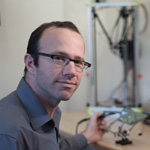 Dave Zucker is a mechanical engineer and the founder of FlySorter, a startup company developing technology to automate Drosophila lab tasks. Previously, he’s designed products for Microsoft, Starbucks, Panasonic, and many other companies, large and small. Dave is intimately familiar with rapid prototyping techniques such as laser cutting and 3D printing, as well as processes for higher volume manufacturing, like plastic injection molding. Since 2014, though, he’s been focused on building a robotic system to phenotype adult flies by sex, eye color, the presence of fluorescent proteins, and other markers. In the fall of 2017, FlySorter received a Small Business Innovation Research (SBIR) grant from NIH to accelerate this project.
Dave Zucker is a mechanical engineer and the founder of FlySorter, a startup company developing technology to automate Drosophila lab tasks. Previously, he’s designed products for Microsoft, Starbucks, Panasonic, and many other companies, large and small. Dave is intimately familiar with rapid prototyping techniques such as laser cutting and 3D printing, as well as processes for higher volume manufacturing, like plastic injection molding. Since 2014, though, he’s been focused on building a robotic system to phenotype adult flies by sex, eye color, the presence of fluorescent proteins, and other markers. In the fall of 2017, FlySorter received a Small Business Innovation Research (SBIR) grant from NIH to accelerate this project.
Education Publishing
Michelle Smith
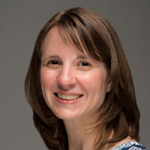 Michelle Smith is the Editor in Chief of CourseSource, an open-access peer-reviewed journal of undergraduate teaching resources, and an Associate Professor in the School of Biology and Ecology at the University of Maine. Smith’s work focuses on how to help students learn biology and faculty adopt promising educational practices in their classrooms. Specifically, she is interested in investigating the origins of pervasive misunderstandings in genetics, determining what aspects of peer discussion make it an effective learning tool in both large-lecture and small-enrollment courses, and collaborating with faculty on undergraduate education research questions in an effort to facilitate course transformation.
Michelle Smith is the Editor in Chief of CourseSource, an open-access peer-reviewed journal of undergraduate teaching resources, and an Associate Professor in the School of Biology and Ecology at the University of Maine. Smith’s work focuses on how to help students learn biology and faculty adopt promising educational practices in their classrooms. Specifically, she is interested in investigating the origins of pervasive misunderstandings in genetics, determining what aspects of peer discussion make it an effective learning tool in both large-lecture and small-enrollment courses, and collaborating with faculty on undergraduate education research questions in an effort to facilitate course transformation.
Sally Elgin
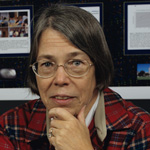 Sarah Elgin’s scientific interests are centered on chromatin structure, in particular the formation of heterochromatin and its impact on gene expression in Drosophila. This has led to an interest in comparative genomics, which has proven to be an excellent area for engaging undergraduates in research while giving them an introduction to bioinformatics. She is the Program Director for the Genomics Education Partnership, a nationwide group of faculty using this approach to set up Course-based Undergraduate Research experiences (CUREs) for their students. Elgin was a founding editor of CBE-Life Sciences Education and is on the Advisory Board for CourseSource. This table will discuss CUREs, genomics education, and how to publish your work in STEM education.
Sarah Elgin’s scientific interests are centered on chromatin structure, in particular the formation of heterochromatin and its impact on gene expression in Drosophila. This has led to an interest in comparative genomics, which has proven to be an excellent area for engaging undergraduates in research while giving them an introduction to bioinformatics. She is the Program Director for the Genomics Education Partnership, a nationwide group of faculty using this approach to set up Course-based Undergraduate Research experiences (CUREs) for their students. Elgin was a founding editor of CBE-Life Sciences Education and is on the Advisory Board for CourseSource. This table will discuss CUREs, genomics education, and how to publish your work in STEM education.
Science Communication & Outreach
Stephanie Mohr
 Stephanie Mohr earned a BA at Wesleyan University and a PhD in Molecular, Cellular and Developmental Biology at the University of Colorado at Boulder (laboratory of Robert E. Boswell), and was a postdoctoral fellow at Harvard University (laboratory of William M. Gelbart). Since 2008, Stephanie has been the Director of the Drosophila RNAi Screening Center (now DRSC/TRiP-Functional Genomics Resources; https://fgr.hms.harvard.edu/) in the laboratory of Norbert Perrimon. Under her leadership, the facility has significantly expanded, adding state-of-the-art equipment, new functional genomics technologies, and new bioinformatics resources. Scientific communication is a significant part of Stephanie’s responsibilities, as well as a personal interest. She tweets from @smohrfly, maintains two informational blogs, http://flyrnai.blogspot.com/and http://flydiseasemodels.blogspot.com/, and more recently founded a website dedicated to fostering communication within and outside the Drosophila community, http://drosophilaresearch.org/. She is also the author of a book about Drosophila research and its impact in biology and biomedicine that is aimed at a non-expert audience, First in Fly: Drosophila Research and Biological Discovery (Harvard University Press).
Stephanie Mohr earned a BA at Wesleyan University and a PhD in Molecular, Cellular and Developmental Biology at the University of Colorado at Boulder (laboratory of Robert E. Boswell), and was a postdoctoral fellow at Harvard University (laboratory of William M. Gelbart). Since 2008, Stephanie has been the Director of the Drosophila RNAi Screening Center (now DRSC/TRiP-Functional Genomics Resources; https://fgr.hms.harvard.edu/) in the laboratory of Norbert Perrimon. Under her leadership, the facility has significantly expanded, adding state-of-the-art equipment, new functional genomics technologies, and new bioinformatics resources. Scientific communication is a significant part of Stephanie’s responsibilities, as well as a personal interest. She tweets from @smohrfly, maintains two informational blogs, http://flyrnai.blogspot.com/and http://flydiseasemodels.blogspot.com/, and more recently founded a website dedicated to fostering communication within and outside the Drosophila community, http://drosophilaresearch.org/. She is also the author of a book about Drosophila research and its impact in biology and biomedicine that is aimed at a non-expert audience, First in Fly: Drosophila Research and Biological Discovery (Harvard University Press).
Andreas Prokop
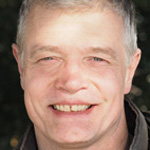 Andreas has worked for almost 30 years with Drosophila on the development and cell biology of the nervous system. He first studied neuronal lineages with Gerd Technau (Cologne and Mainz, Germany), then synapses with Michael Bate (Cambridge, UK), and eventually the neuronal cytoskeleton – initially as Heisenberg fellow in Mainz, and since 2004 as senior lecturer and now professor in Manchester (UK). Andreas has published a training package for Drosophila genetics which is now in worldwide use, and has been an important driver of Drosophila advocacy and science communication for over 7 years, implemented via the Manchester Fly Facility and droso4school initiatives, which have produced a plethora of shared resources, strategies, and publications. As communications officer of the British Society for Developmental Biology he has initiated an advocacy campaign promoting developmental biology, and he has recently published a special issue on science communication in the biomedical sciences.
Andreas has worked for almost 30 years with Drosophila on the development and cell biology of the nervous system. He first studied neuronal lineages with Gerd Technau (Cologne and Mainz, Germany), then synapses with Michael Bate (Cambridge, UK), and eventually the neuronal cytoskeleton – initially as Heisenberg fellow in Mainz, and since 2004 as senior lecturer and now professor in Manchester (UK). Andreas has published a training package for Drosophila genetics which is now in worldwide use, and has been an important driver of Drosophila advocacy and science communication for over 7 years, implemented via the Manchester Fly Facility and droso4school initiatives, which have produced a plethora of shared resources, strategies, and publications. As communications officer of the British Society for Developmental Biology he has initiated an advocacy campaign promoting developmental biology, and he has recently published a special issue on science communication in the biomedical sciences.
Here is a link to all Prokop’s science communication publications: http://www.prokop.co.uk/References/References-body.html#scicomm.
Staff Scientist Careers
Claire Hu
 Yanhui (Claire) Hu is a bioinformatician with more than 15 years of experience in mammalian, Drosophila, and other model systems. As bioinformatician at the Harvard Institute of Proteomics (2000–2010), Dr. Hu developed two text-mining tools, MedGene and BioGene, which have been licensed by pharmaceutical companies, as well as being used by the academic research community to identify genes associated with human diseases and biological/chemical themes from PubMed literature, along with many other contributions to research and community resource projects. In 2010, Hu joined the Drosophila RNAi Screening Center (DRSC, now DRSC/TRiP-FGR) as senior bioinformatician. Since 2016, she has been the director of informatics of DRSC/TRiP-FGR. Hu works closely with researchers, programmers, and others to accomplish common goals in reagent design, reagent identification, data analysis, and hypothesis-driven functional discovery. At the DRSC, Hu has developed an integrative tool for ortholog predictions among major model organisms, DIOPT, as well as the related human disease gene ortholog prediction tool, DIOPT-DIST, and applied these tools in various ways, including for disease-focused studies in Drosophila. DIOPT has been proven to be a valuable resource and has been integrated into other databases, e.g. FlyBase and AGR (Alliance of Genome Resources). Hu has also developed or otherwise contributed to several other projects in the areas of reagent design (qPCR primers, CRISPR gRNAs), reagent identification (UP-TORR), project design/management (HuDis-TRIP, CRIMIC), data analysis (COMPLEAT, SignedPPI, DGET and MIST) and functional discovery (gene2function). Each of the online resources Hu developed is freely available online at https://fgr.hms.harvard.edu/. Hu also has been an active member of the international consortium of ORFeome Colloboration (OC) since its inception in 2005, serving initially as a bioinformatician and since 2010 as a member of the OC advisory group. Hu engages her broad scientific background and computer skills to understand, design, and develop bioinformatics software tools to meet the specific needs of individual projects or the research community more generally.
Yanhui (Claire) Hu is a bioinformatician with more than 15 years of experience in mammalian, Drosophila, and other model systems. As bioinformatician at the Harvard Institute of Proteomics (2000–2010), Dr. Hu developed two text-mining tools, MedGene and BioGene, which have been licensed by pharmaceutical companies, as well as being used by the academic research community to identify genes associated with human diseases and biological/chemical themes from PubMed literature, along with many other contributions to research and community resource projects. In 2010, Hu joined the Drosophila RNAi Screening Center (DRSC, now DRSC/TRiP-FGR) as senior bioinformatician. Since 2016, she has been the director of informatics of DRSC/TRiP-FGR. Hu works closely with researchers, programmers, and others to accomplish common goals in reagent design, reagent identification, data analysis, and hypothesis-driven functional discovery. At the DRSC, Hu has developed an integrative tool for ortholog predictions among major model organisms, DIOPT, as well as the related human disease gene ortholog prediction tool, DIOPT-DIST, and applied these tools in various ways, including for disease-focused studies in Drosophila. DIOPT has been proven to be a valuable resource and has been integrated into other databases, e.g. FlyBase and AGR (Alliance of Genome Resources). Hu has also developed or otherwise contributed to several other projects in the areas of reagent design (qPCR primers, CRISPR gRNAs), reagent identification (UP-TORR), project design/management (HuDis-TRIP, CRIMIC), data analysis (COMPLEAT, SignedPPI, DGET and MIST) and functional discovery (gene2function). Each of the online resources Hu developed is freely available online at https://fgr.hms.harvard.edu/. Hu also has been an active member of the international consortium of ORFeome Colloboration (OC) since its inception in 2005, serving initially as a bioinformatician and since 2010 as a member of the OC advisory group. Hu engages her broad scientific background and computer skills to understand, design, and develop bioinformatics software tools to meet the specific needs of individual projects or the research community more generally.
Alexei Arnaoutov
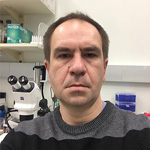 Alexei Arnaoutov works at the National Institutes of Health. He graduated from St. Petersburg State University, Russia, with a MS in Biochemistry and obtained his PhD from the Institute of Cytology, Russian Academy of Sciences. After completing his postdoctoral training at NICHD/NIH, he joined Mary Dasso’s laboratory at NICHD/NIH in 2005 as a staff scientist. He is currently working on understanding the mechanics that link cell cycle to cell differentiation.
Alexei Arnaoutov works at the National Institutes of Health. He graduated from St. Petersburg State University, Russia, with a MS in Biochemistry and obtained his PhD from the Institute of Cytology, Russian Academy of Sciences. After completing his postdoctoral training at NICHD/NIH, he joined Mary Dasso’s laboratory at NICHD/NIH in 2005 as a staff scientist. He is currently working on understanding the mechanics that link cell cycle to cell differentiation.













